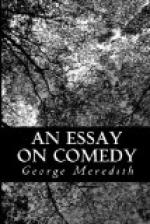But those two ravishing women, so copious and so choice of speech, who fence with men and pass their guard, are heartless! Is it not preferable to be the pretty idiot, the passive beauty, the adorable bundle of caprices, very feminine, very sympathetic, of romantic and sentimental fiction? Our women are taught to think so. The Agnes of the Ecole des Femmes should be a lesson for men. The heroines of Comedy are like women of the world, not necessarily heartless from being clear-sighted: they seem so to the sentimentally-reared only for the reason that they use their wits, and are not wandering vessels crying for a captain or a pilot. Comedy is an exhibition of their battle with men, and that of men with them: and as the two, however divergent, both look on one object, namely, Life, the gradual similarity of their impressions must bring them to some resemblance. The Comic poet dares to show us men and women coming to this mutual likeness; he is for saying that when they draw together in social life their minds grow liker; just as the philosopher discerns the similarity of boy and girl, until the girl is marched away to the nursery. Philosopher and Comic poet are of a cousinship in the eye they cast on life: and they are equally unpopular with our wilful English of the hazy region and the ideal that is not to be disturbed.
Thus, for want of instruction in the Comic idea, we lose a large audience among our cultivated middle class that we should expect to support Comedy. The sentimentalist is as averse as the Puritan and as the Bacchanalian.
Our traditions are unfortunate. The public taste is with the idle laughers, and still inclines to follow them. It may be shown by an analysis of Wycherley’s Plain Dealer, a coarse prose adaption of the Misanthrope, stuffed with lumps of realism in a vulgarized theme to hit the mark of English appetite, that we have in it the keynote of the Comedy of our stage. It is Moliere travestied, with the hoof to his foot and hair on the pointed tip of his ear. And how difficult it is for writers to disentangle themselves from bad traditions is noticeable when we find Goldsmith, who had grave command of the Comic in narrative, producing an elegant farce for a Comedy; and Fielding, who was a master of the Comic both in narrative and in dialogue, not even approaching to the presentable in farce.
These bad traditions of Comedy affect us not only on the stage, but in our literature, and may be tracked into our social life. They are the ground of the heavy moralizings by which we are outwearied, about Life as a Comedy, and Comedy as a jade, {4} when popular writers, conscious of fatigue in creativeness, desire to be cogent in a modish cynicism: perversions of the idea of life, and of the proper esteem for the society we have wrested from brutishness, and would carry higher. Stock images of this description are accepted by the timid and the sensitive, as well as by the saturnine, quite seriously; for not many




